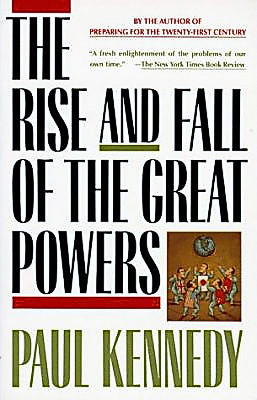
Was Paul Kennedy right over twenty years ago when he predicted the decline of the United States (and Russia) vis-a-vis China, India, Japan? (ok so he was wrong about Japan.) In 1987, Mr. Kennedy published, The Rise and Fall of the Great Powers. For those unfamiliar with this very important and influential book, it is worth a read now more than ever.
The book examines all of the great powers starting with the Ming dynasty and works it way up through the 20th century. Kennedy looks for the root causes of both the rise and fall of these super powers over time.
The main cause for the falls? Military over-extendedness. Eventually, all great powers over extended themselves militarily around the world—especially relative to their economic growth and ability to sustain those endeavors.
With the super-power over-stretched, weaker tangential players took advantage of technological and/or economic advances and gained the upper hand.
Many critics faulted Kennedy for a number of years after the book was written. They claimed he over simplified things and did not take in to account the peace dividend of democratic nations. Democratic nations now fight in the marketplace not on the battlefield.
But, at the time the book was published, the Soviet Union was in the start of its rapid decline—a decline so rapid no one would of guessed that the US would be left as the world's sole super power in just a few short years. That is, because the Soviet Union quickly crumbled, it no longer pulled us down with it in a never ending arms race. The cold war over, we were able to reinvest in our industries not the military. Kennedy was not in a position to predict that in 1987.
But then came 9-11 and a the US found itself caught up in a never-ending war on terror. It is no secret our military is now over-extended almost to the breaking point.
Recent critics of book were still quick to point out that we continued to have the worlds most enviable economy producing wealth at an unprecedented pace. The exact kind of economic prowess that has saved other powers in history from an untimely decline.
Well, not anymore. Our economy is now in freefall. Mr. Kennedy may of been right after all.
So who will sit atop the world in the next 100 years as the dominate player? Or, can the US regain the upper-hand? Thoughts?





1 comment:
Well, China has the advantage of not engaging in nation building and wars around the world (only in small-scale repressions at home :( ), so it could be a good candidate. However, it doesn't strike me as a probable future world's dominating player.
How does Francis Fukuyama measure up with Kennedy on this topic?
Post a Comment